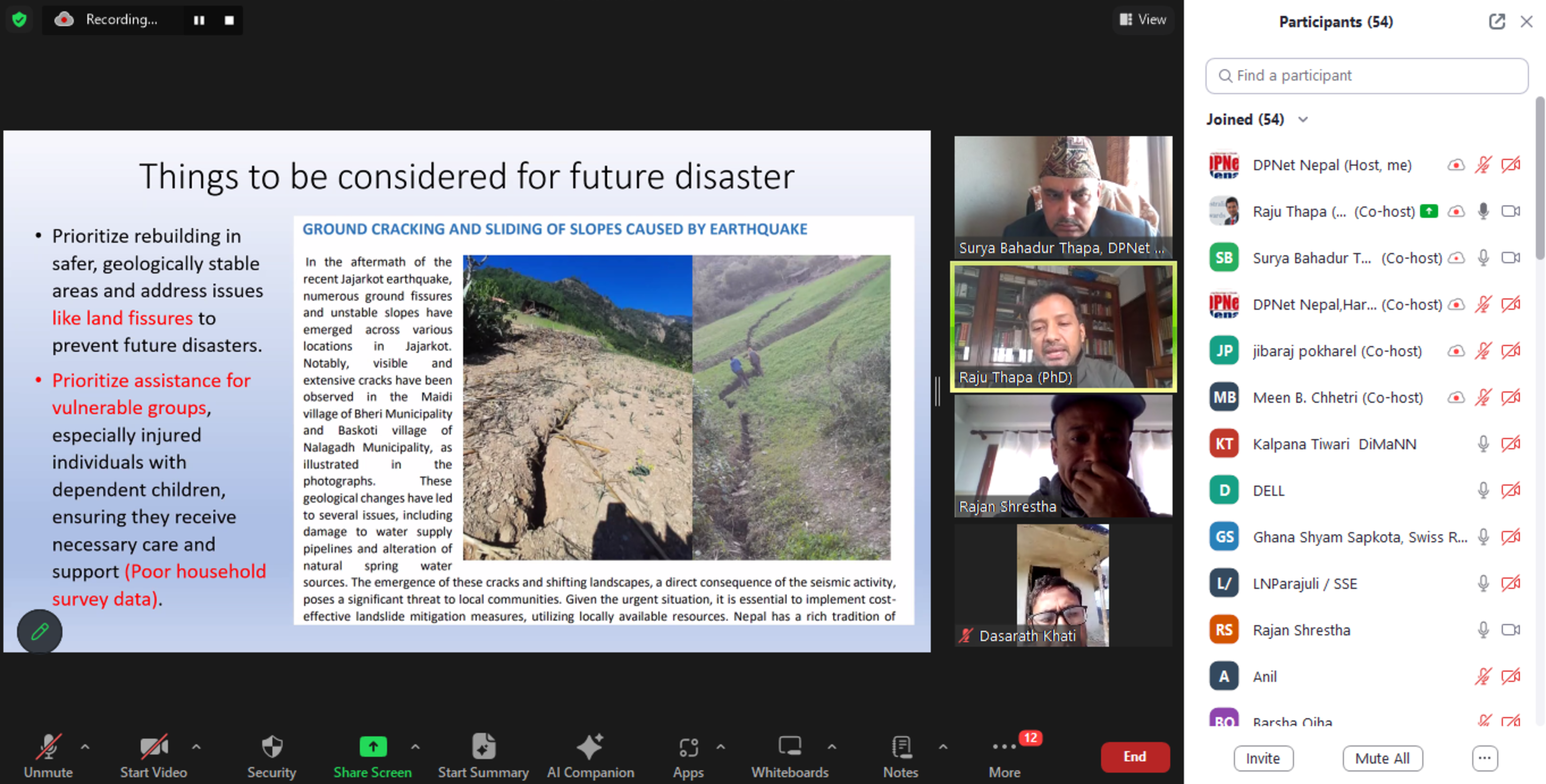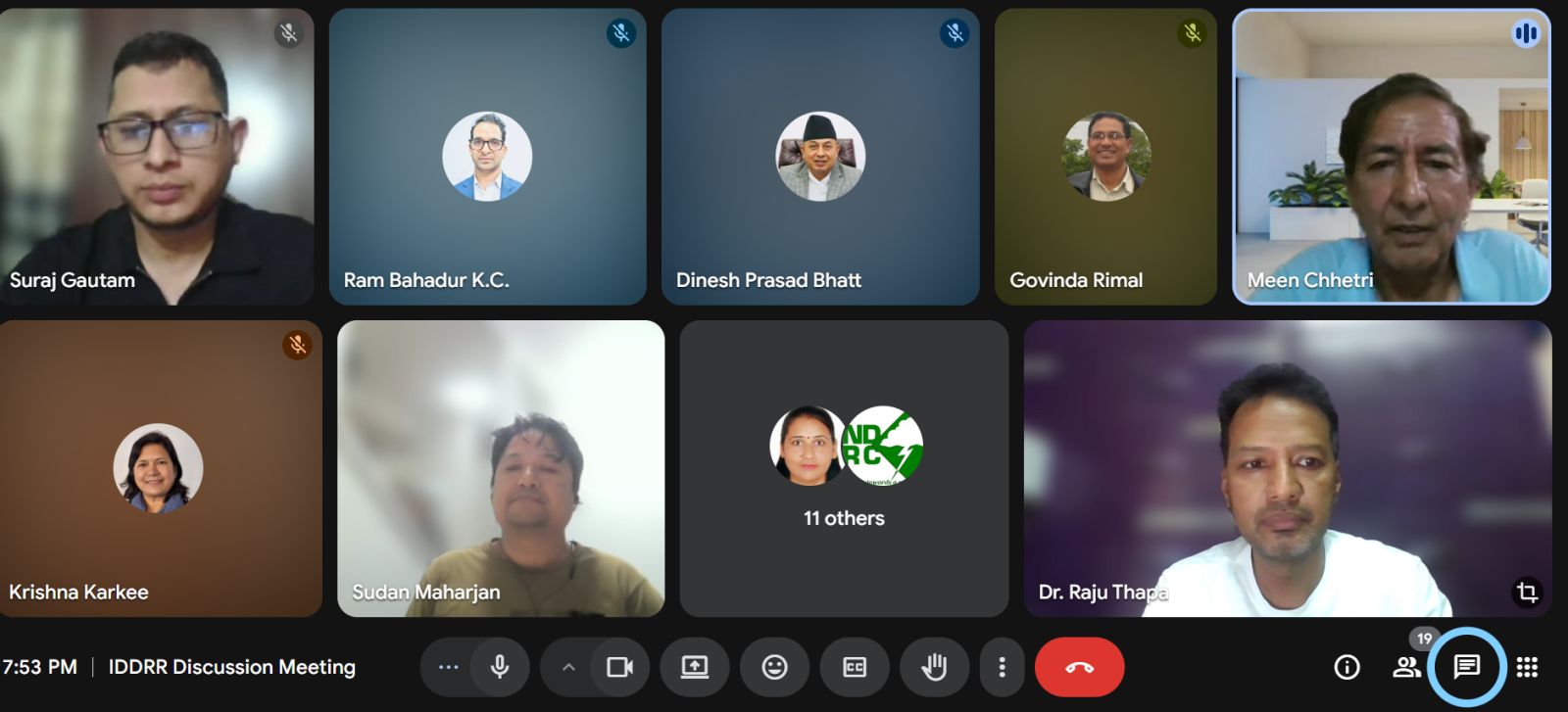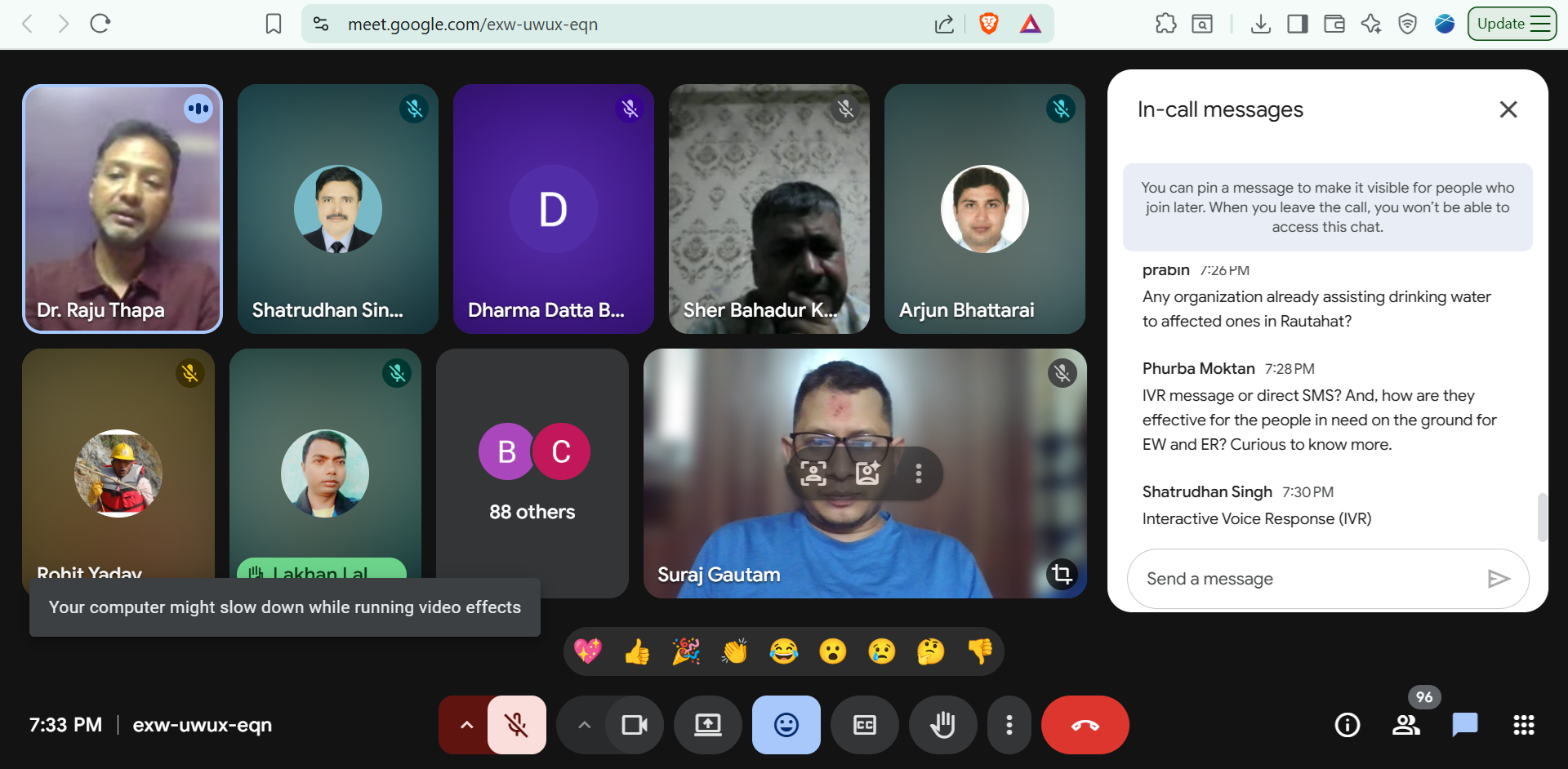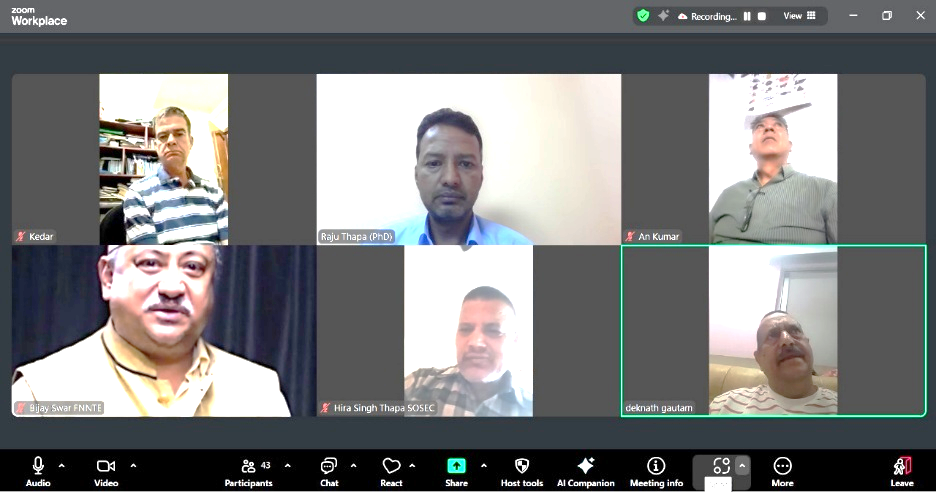Lessons Learned and Future Directions from Jajajrkot Field Visit

In a virtual event held on 19th February 2024 in support of UN FAO, the DPNet shared the aftermath and recovery efforts following the devastating Jajarkot earthquake. This online gathering, chaired by DPNet Chair, Surya Bahadur Thapa, and with the contextual stage set by Vice Chair Dr. Raju Thapa, drew participation from 64 attendees, highlighting the urgency and importance of post disaster review in the wake of recent Jajarkot earthquake.
Dr. Thapa opened with a thought-provoking presentation on the Jajarkot earthquake, contrasting it with the Bajhang earthquake to highlight the critical role of early warning systems in mitigating disaster impact.
Dr. Thapa highlighted the recent seismic events in Bajhang and Jajarkot, emphasizing their distinct characteristics. The Bajhang earthquake, with a magnitude of 6.3 during the day, was preceded by a foreshock measuring 5.3, just 26 minutes earlier, tragically resulting in one fatality. Conversely, the Jajarkot earthquake struck with a magnitude of 6.4 at 11:48 PM midnight, without any foreshock, yet the toll was significantly higher, with 154 fatalities recorded. Dr. Thapa highlighted the importance of early warning systems in mitigating such losses, particularly noting that there was an early warning issued prior to the Jajarkot earthquake by google earthquake center. He also discussed the Earthquake Alert Service provided by Google, which utilizes a crowdsourced approach, suggesting its potential in enhancing timely alerts and preparedness for seismic events in vulnerable regions However, the presentation also touched upon a sobering reality: despite a Supreme Court directive in 2015, Nepal has seen little progress in establishing its Earthquake Early Warning System. This stagnation calls for an urgent reassessment of priorities, with potential collaborations with entities like Google suggested as a viable pathway to enhancing Nepal’s disaster response capabilities.
The field visit segment, led by Dr. Meen Bahadur Poudel Chhetri, provided an in-depth analysis of the Jajarkot and Rukum West districts' situation post-earthquake. The findings were a sober reminder of the earthquake's extensive damage, including the loss of 154 lives and the destruction or damage of over 61,000 homes. This segment underscored the dire need for comprehensive disaster preparedness and resilient infrastructure to mitigate such devastating outcomes in the future.
The recovery efforts, as shared by the field team, showcased a commendable swift response from security agencies, government, and humanitarian organizations. The immediate deployment of resources and the quick restoration of essential services of effective crisis management. However, the discussions also highlighted significant areas for improvement, particularly in terms of coordination, policy enforcement, and technological adoption for disaster management.
Prof. Dr. Jib Raj Pokhrel’s presentation on temporary shelter construction using local materials such as bamboo, mud, and plastic sheets offered practical insights into sustainable disaster recovery solutions. Emphasizing the shelters' thermal efficiency, cost-effectiveness, and the use of local manpower and materials, Dr. Pokhrel’s talk illustrated the potential for such innovative approaches to form the backbone of future recovery efforts.
The event also shed light on the crucial role of agriculture and livestock in the affected regions’ economies. FAO initiatives, including the distribution of 40,000 hermetic bags in collaboration with DPNet, highlighted as key interventions in safeguarding the livelihoods of the earthquake-impacted populations to prevent grain and seed in times of disaster.
Looking forward, Chair Thapa outlined several recommendations for enhancing disaster preparedness and response. These included the introduction of a unified relief tracking form, the clarification of the One Door policy, the prioritization of rebuilding in safer areas, and the establishment of special care programs for the most vulnerable populations. Additionally, the need for technical training for local masons and builders was emphasized, aiming to address the critical shortage of skilled labor necessary for constructing resilient houses.
After this presentation, the open floor discussions culminated in a vibrant question and answer session, where attendees engaged with the presenters on various aspects of disaster management, from policy implementation to the technical nuances of earthquake resilience. During a discussion session, various experts and advisors shared insights and concerns regarding disaster preparedness and response plans. Mr. Pitambar Aryal, former chair and current advisor of DPNet, suggested conducting informative programs physically to enhance their effectiveness. He also inquired about the durability of plastic sheets in sunlight and rainfall, as well as the suitability of bamboo versus wood for supporting water tanks on rooftops. Mr. Ram Prasad Bhandari, Technical advisor at DPNet, highlighted a discrepancy in the Disaster Preparedness and Response Plan between districts and stressed the importance of effective utilization of such plans. He emphasized record-keeping for temporary residents and the need for organized volunteer efforts during and after disasters. Mr. Nabin Kumar Shahi from Jajarkot emphasized the necessity of training local elected representatives and requested experts to provide training on temporary housing. He raised concerns about deforestation for shelter construction and urged leaders to consider environmental implications.
Mr. Kedar Neupane, also a Technical Advisor at DPNet, emphasized analyzing efforts under the Build Back Better initiative to assess progress and identify areas needing improvement, including employment opportunities. Mr. Deepak Acharya from CIN, Acorab Nepal, focused on health and hygiene issues, highlighting incidents of water source depletion leading to waterborne diseases. Mr. Govinda Rimal, another Technical Advisor at DPNet, stressed the importance of feedback mechanisms and targeted approaches in humanitarian efforts. Ms. Chadani Joshi, an Advisor at DPNet, urged prioritizing women in disaster response efforts, emphasizing their significant role and the need for gender-segregated data and documentation. Prof. Dr. Jiba Raj Pokherel clarified technical aspects regarding water tank support and plastic sheet durability, promoting bamboo over wood usage. Mr. Prakash Acharya from UNICEF mentioned ongoing work on complaint-feedback mechanisms. Mr. Gopal Krishna Basnet from CSRC raised concerns about maintaining temperature-friendly environments in already constructed shelters, prompting further discussion on potential solutions. Finally, Chair Thapa thanked all for their active participation and formally close the program.











